S.R. Piccoli's Blog, page 11
February 29, 2016
Why We Continue Looking at the Sky

 How does a person feel when looking at the sky? He thinks that he doesn’t have enough tongues to describe what he sees. Nevertheless, people have never stopping describing the sky, simply listing what they see... We have a limit, a very discouraging, humiliating limit: death. That’s why we like all the things that we assume have no limits and, therefore, no end. It’s a way of escaping thoughts about death. We like lists because we don’t want to die.
How does a person feel when looking at the sky? He thinks that he doesn’t have enough tongues to describe what he sees. Nevertheless, people have never stopping describing the sky, simply listing what they see... We have a limit, a very discouraging, humiliating limit: death. That’s why we like all the things that we assume have no limits and, therefore, no end. It’s a way of escaping thoughts about death. We like lists because we don’t want to die. ~ Umberto Eco, Interview with Der Spiegel, 2009.

Umberto Eco died a few days ago, but he lives on in his books, articles, essays and interviews. He has left a huge legacy that will surely benefit generations to come. Sit tibi terra levis, professor Eco.COPYRIGHT NOTICE:
All original content of this blog [Wind Rose Hotel] is subject to
Creative Commons license (by-nc-sa)













Published on February 29, 2016 16:22
February 25, 2016
Yes, Donald Trump Is America's Silvio Berlusconi
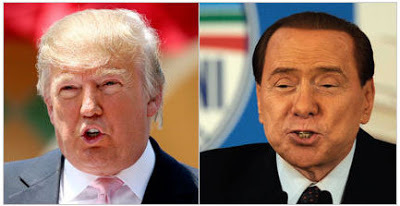
It has happened. What was thought to be impossible has now come to reality. After Donald Trump’s third-in-a-row victory in the Nevada caucuses Tuesday, the confident predictions about his candidacy over the past eight months “have been disproven again and again—starting with the judgment that he wouldn’t run, that his outrageous statements would undermine his appeal, that voters would show up for the entertainment value of his rallies but not cast a ballot for him when it mattered,” says USA today. Now the question is no longer can Trump win— it’s can he be stopped?
For us who have lived in Italy in the last 20 years it would be hard not to compare the Donald to the man who ruled Italy for a total of nine years between 1994 and 2011, Silvio Berlusconi, whose political career was—like Trump’s—rooted in both popular entertainment culture and real estate. “The similarities between Donald Trump and Silvio Berlusconi are striking,” writes Italian columnist and essayist Beppe Severgnini in the New York Times: “Both are loud, vain, cheeky businessmen, amateur politicians and professional womanizers. Both have a troubled relation with their egos and their hair. Both think God is their publicist, and twist religion to suit their own ends.” But the above description is (intentionally) more evocative than accurate. Therefore, let’s try to summarize the similarities between the two in more systematic way :
Like Berlusconi, who presented himself as Italy’s strongman, a political outsider who entered politics out of patriotism to save Italy from the Left, promising to restore the country to its lost international stature, and big things such as “less taxes for everyone,” “a million new jobs,” etc., Trump presents himself as the living antidote to decline, the GOP’s savior who promises “to make America greater than ever before” and to become the “best jobs president God ever created.”Berlusconi speaks more like an entertainer than a politician, and his clowning sense of humor is legendary. Trump, in turn, has built a political campaign employing unvarnished language and jaundiced humor. Most Italians think Berlusconi “just speaks his mind” (and they don’t care if foreigners are puzzled, or worse). Similarly, many Americans think Trump is straightforward and brutally honest in all of his dealings, and that “that’s what we need in the leader of our country.”Like Berlusconi, Trump is running on his claim of being a rich, successful businessman: “I don’t need anyone else’s money, I’m really rich,” he said. “I have total net worth of $8.73bn. I’m not doing that to brag. I’m doing that to show that’s the kind of thinking our country needs.”Like Berlusconi, Italy’s biggest TV tycoon, Trump “has leveraged his wealth, celebrity, and manipulation of the media […] into political prominence,” as Robert Tracinskiy—one of their many detractors—writes in The Federalist.Like Berlusconi, Trump “makes his own life, personality, and outrageous statements the center of a national political circus act” (ibidem)Berlusconi’s political success largely benefited from the backwardness of the Italian Left—let’s not forget that the Democratic Party is made up mostly of former Communists, whose totalitarian tendencies are well known and, so to speak, encoded in its DNA—just as Trump might benefit from the Democrats’ march toward socialism.Both Berlusconi and Trump exploited voters’ rage at a discredited political establishment. In Italy, it was their own poor reputations in voters’ eyes that prevented established politicians, viewed as inept, corrupt, boring and uninterested in the concerns of ordinary Italians, from fending off Berlusconi’s challenge, as Rula Jebreal—a Palestinian foreign policy analyst and journalist with dual Israeli and Italian citizenship—puts it. Similarly, Trump has managed to tap into real anger and disillusionment with the American political class and a gridlocked political system, viewed as incapable of taking action to relieve the plight of middle class Americans, much less help the poor.Another similarity between Trump and Berlusconi, as Severgnini fairly notes, is that “they both bring to politics a flair for seduction that served them well in their previous careers in construction, television and entertainment (and elsewhere, or so it’s said). They know their message ought to be reassuring and easily digestible. Both are convinced that, in an era obsessed with appearances, image is key.”Furthermore, Trump’s recent sexist attacks on female candidates and journalists—such as opponent Carly Fiorina and Fox News anchor Megyn Kelly—remind us of when Berlusconi dismissed opponents as “too ugly to be taken seriously,” or when he referred to the German Chancellor Angela Merkel using two derogatory terms in a telephone conversation with a newspaper editor.Last but not least, both of them are hardcore narcissists...
So far, however, those who have written about how much Trump and Berlusconi are similar have focused mostly on the negative aspects of their respective personalities and behaviors. Therefore their main contribution to the discussion was to warn public opinion about the absolute necessity of stopping the “populist insurrection” of Donald Trump. A bit too simplistic and one-sided, in my view. They don’t take into account two important considerations.
First, not everything Berlusconi did was bad. He did good things as well, and sometimes very good things such as his epoch-making operation—though somehow incomplete—of legitimizing the Right within the Italian political system. As Italian historian and columnist Ernesto Galli della Loggia put it, Berlusconi “has re-established the Right electorally and in government, but has failed to restore its social or cultural legitimacy. He has failed in the only way this is ever accomplished, by creating and establishing at grass roots a real party, organized and structured as such, a vehicle for demands, a hub for relations with various circles and people, a formulator of proposals and a collector of ideas.”
 Second, unlike what many seem to think, not everything Trump does and says is wrong, vulgar, clownesque, etc. “Trumpism,” as Charles Murray puts it in this WSJ Saturday essay, “is an expression of the legitimate anger that many Americans feel about the course that the country has taken, and its appearance was predictable. It is the endgame of a process that has been going on for a half-century: America’s divestment of its historic national identity.” Believe me, this is not a partisan point of view but an intellectually honest overview of America and its society: definitely a must read for everyone to understand what is at stake in the next few months.
Second, unlike what many seem to think, not everything Trump does and says is wrong, vulgar, clownesque, etc. “Trumpism,” as Charles Murray puts it in this WSJ Saturday essay, “is an expression of the legitimate anger that many Americans feel about the course that the country has taken, and its appearance was predictable. It is the endgame of a process that has been going on for a half-century: America’s divestment of its historic national identity.” Believe me, this is not a partisan point of view but an intellectually honest overview of America and its society: definitely a must read for everyone to understand what is at stake in the next few months. What I do agree with some critics of the “magical duo” is their warning that to dismiss Donald Trump as a joke, as many Italians did with Silvio Berlusconi early on, and many Americans continue to do with the New York tycoon, would be a terrible mistake in any case. On the other hand, apart from being unjust per se, obsessing over him would be yet another big mistake. By the way, from his own point of view Severgnini is perfectly right: “to obsess over him is exactly what the man wants. ‘You see?’ he can say. ‘They all gang up on me, those establishment types!’” Besides, this would be yet another similarity with the Berlusconi case.COPYRIGHT NOTICE:
All original content of this blog [Wind Rose Hotel] is subject to
Creative Commons license (by-nc-sa)













Published on February 25, 2016 17:19
February 22, 2016
Books

 Books are not made to be believed, but to be subjected to inquiry. When we consider a book, we mustn’t ask ourselves what it says but what it means.
Books are not made to be believed, but to be subjected to inquiry. When we consider a book, we mustn’t ask ourselves what it says but what it means. ~ Umberto Eco, The Name of the Rose, 1980 (English translation by William Weaver, 1982).

When Umberto Eco wrote The Name of the Rose (it was released in Italy in 1980, followed by French and English editions two years later) he could never have imagined what a cultural phenomenon he'd created. No one who loves and cares about books and their fate in the present world should miss reading, re-reading and reflecting upon this great novel. The Name of the Rose is a book that speaks of other books, a book whose main focus are the books themselves...COPYRIGHT NOTICE:
All original content of this blog [Wind Rose Hotel] is subject to
Creative Commons license (by-nc-sa)













Published on February 22, 2016 15:10
February 14, 2016
Trump’s America

Are you dismayed by Trumpism? Well, you definitely are in good company. But you’d better read this WSJ Saturday essay by Charles Murray before you jump to hasty conclusions, because Trumpism is nothing but “an expression of the legitimate anger that many Americans feel about the course that the country has taken, and its appearance was predictable. It is the endgame of a process that has been going on for a half-century: America’s divestment of its historic national identity.” And the historic American identity is rooted in the Anglo-Protestant heritage and what we may call the very idea of America… As historian Richard Hofstadter once said, “It has been our fate as a nation not to have ideologies but to be one.” But this is just the prologue. Highly recommended.COPYRIGHT NOTICE:
All original content of this blog [Wind Rose Hotel] is subject to
Creative Commons license (by-nc-sa)













Published on February 14, 2016 12:39
December 10, 2015
What Is Your Relationship with Power?

 Rhine-gold! Rhine-gold! / guileless gold! / O would that thy treasure / were glittering yet in the deep! / Tender and true ’tis but in the waters: / false and base are all who revel above!
Rhine-gold! Rhine-gold! / guileless gold! / O would that thy treasure / were glittering yet in the deep! / Tender and true ’tis but in the waters: / false and base are all who revel above!~ Richard Wagner, Das Rheingold (Der Ring des Nibelungen, Vorabend), 1854, first performance: September 22, 1869, National Theatre Munich.

What is your relationship with power? If you ask me what is my personal philosophy on this, the answer is in the above quoted “Rhine Daughters’ Lament” at the end of Richard Wagner’s Das Rheingold...COPYRIGHT NOTICE:
All original content of this blog [Wind Rose Hotel] is subject to
Creative Commons license (by-nc-sa)













Published on December 10, 2015 07:48
November 28, 2015
The Sainte Baume
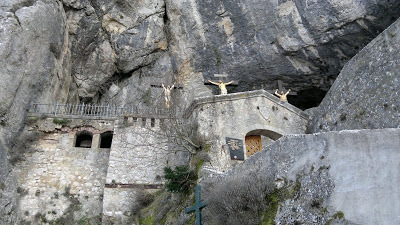 The Sainte Baume (click to enlarge)
The Sainte Baume (click to enlarge)Photo courtesy of BACKYARDPROVENCE
Last night while attending a conference on medieval studies, I heard the speaker touching on a subject I happen to be quite fond of, the Sainte Baume, which is a sanctuary in Southern France, in Provence. I first stumbled upon that place almost by chance—and suddenly fell in love with it—several years ago. Since then I went back a couple of times, and always enjoyed the magic of the location.
Most of the charm of the Sainte Baume comes from an old legend or tradition, according to which Mary Magdalene, her brother Lazarus, her sister Martha, Martha’s maid Martilla, Maximinus, one of the Lord’s seventy-two disciples, and Cedonius, expelled by persecutions from the Holy Land, traversed the Mediterranean Sea in a frail boat and landed at the place called Saintes-Maries-de-la-Mer, near Arles. Then they traveled by land to Massilia (Marseille). Here is how Jacobus de Voragine tells the story:
Then fourteen years after the passion and ascension of the Lord, long after the Jews had killed Stephen and expelled the rest of the disciples from Judean territory, the disciples went off to spread the word of the Lord in the various regions inhabited by the Gentiles. At that time blessed Maximinus, one of the Lord’s seventy-two disciples, was with the apostles, and it was to his care that Peter had entrusted Mary Magdalene. When the disciples went their separate ways, the blessed Maximinus, Mary Magdalene, her brother Lazarus, her sister Martha, Martha’s maid Martilla, and the blessed Cedonius, who had been blind from his birth but was cured by the Lord together with many other Christians, were put on board ship by unbelievers and set adrift on the sea without pilot so that they should be all drowned. But by God’s will they reached Marseilles. There they found nobody prepared to take them in, so they sheltered under the portico of a shrine where the people of the region worshipped. When the blessed Mary Magdalene saw the people streaming to the shrine to sacrifice to their idols, she got up, quite calmly, and with a serene expression on her face and with measured words, began to turn them from their idol worship and with great single-mindedness to preach the Gospel of Christ. Everyone there admired her for her beauty, for her eloquence and for her sweet manner of speaking. And it is no wonder that the lips which had pressed kisses so loving and so tender on our Lord’s feet should breathe the perfume of the word of God more copiously than others.
[The Golden Legend, Jacobus de Voragine]
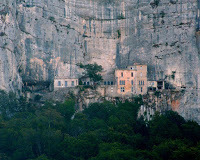 The Sainte Baume
The Sainte Baume(Click to enlarge)After this, Mary Magdalene is said to have retired to a cave on a hill by Marseille, La Sainte-Baume (“Holy Cave”, baumo in Provençal), where she spent the last thirty years of her life.
The route to the Sainte Baume is very beautiful and scenic. Leaving the nice village of Saint-Maximin-la-Sainte-Baume, the road winds its way up the hill. Pilgrims and visitors must park their car in the Hostellerie de La Sainte Baume, which is run by the Dominican sisters. From the old Hostellerie, which stands alone in a wooded valley, a path leads to the austere cliff and the sanctuary carved in the mountain.
As I already touched on, every detail of the sanctuary, starting from the physical characteristics of the site itself, has its own magic, but there are no words, or pictures, or videos that can capture the essence and beauty of the place. You just have to go there!
Ah, I almost forgot—when I first went there it was the feast day of St. Mary Magdalene, July 22, as I realized once I was there and unexpectedly got involved in the celebrations... COPYRIGHT NOTICE:
All original content of this blog [Wind Rose Hotel] is subject to
Creative Commons license (by-nc-sa)













Published on November 28, 2015 02:44
November 24, 2015
Holden Caulfield's Favorite Books
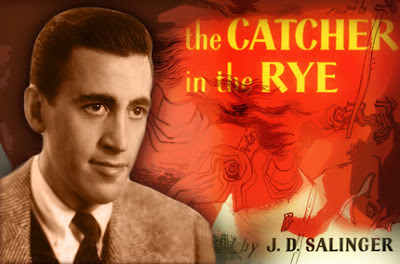
 What really knocks me out is a book that, when you're all done reading it, you wish the author that wrote it was a terrific friend of yours and you could call him up on the phone whenever you felt like it.
What really knocks me out is a book that, when you're all done reading it, you wish the author that wrote it was a terrific friend of yours and you could call him up on the phone whenever you felt like it. ~ J. D. Salinger, The Catcher in the Rye, 1951.

I couldn't agree more with this quote, which is deeply true in its naivete. Of course, like any great quote, it should be adapted to the current situation—the 50s were the age of telephone, the current age is that of the Internet and the social media...COPYRIGHT NOTICE:
All original content of this blog [Wind Rose Hotel] is subject to
Creative Commons license (by-nc-sa)













Published on November 24, 2015 15:00
November 15, 2015
A Christian Story in the Spirit of C.S. Lewis
 The story is set in a dystopian future in which humans have built walls and barricades to protect themselves from a world that has become a very dangerous place… A centuries-old wall stands over 30 meters high and 5 meters thick. It encircles the entire village, called the Wee, and keeps the demons out. Of course, at the same time, it locks people in. But one day the demons—not mere metaphors, but flesh and blood living entities—break through the village walls. A restless and somewhat impetuous sixteen-year-old girl named Fox Fire joins Cross Academy to be trained for the fight against the evil monsters. Things get more and more complicated when Fox Fire’s best friend KI—who had his parents killed by the demons several years before—becomes he himself demon possessed.
The story is set in a dystopian future in which humans have built walls and barricades to protect themselves from a world that has become a very dangerous place… A centuries-old wall stands over 30 meters high and 5 meters thick. It encircles the entire village, called the Wee, and keeps the demons out. Of course, at the same time, it locks people in. But one day the demons—not mere metaphors, but flesh and blood living entities—break through the village walls. A restless and somewhat impetuous sixteen-year-old girl named Fox Fire joins Cross Academy to be trained for the fight against the evil monsters. Things get more and more complicated when Fox Fire’s best friend KI—who had his parents killed by the demons several years before—becomes he himself demon possessed.Pleasantly and colorfully written, Cross Academy is recommended if you like dark epic fantasy. But this book is more complex (structurally and thematically) than you’d think. In fact it is written by an American committed and devout Christian, Valicity Garris, in the spirit of C.S. Lewis. It’s a Christian story, though an unconventional one, which reminds us that “our struggle is not against flesh and blood, but against the rulers, against the authorities, against the powers of this dark world and against the spiritual forces of evil in the heavenly realms” (Ephesians 6:12).COPYRIGHT NOTICE:
All original content of this blog [Wind Rose Hotel] is subject to
Creative Commons license (by-nc-sa)













Published on November 15, 2015 16:17
November 10, 2015
A Powerful and Mesmerizing Story
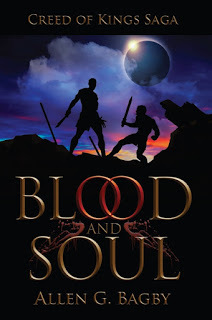 This book was definitely worth my time and I am glad to have read it! Not that I’m a big reader of the fantasy fiction genre—even though perhaps
Blood and Soul
, by Allen G. Bagby, transcends its genre and seeks to understand the basis of human existence, and that’s also why I enjoyed the read so much, and once started reading I couldn’t put it down. Fascinating and complex characters, sparkling dialog, and intriguing plots combine to create a powerful and mesmerizing story that I highly recommend to all lovers of fantasy and high adventure.
This book was definitely worth my time and I am glad to have read it! Not that I’m a big reader of the fantasy fiction genre—even though perhaps
Blood and Soul
, by Allen G. Bagby, transcends its genre and seeks to understand the basis of human existence, and that’s also why I enjoyed the read so much, and once started reading I couldn’t put it down. Fascinating and complex characters, sparkling dialog, and intriguing plots combine to create a powerful and mesmerizing story that I highly recommend to all lovers of fantasy and high adventure.Set in a world similar to our Middle Ages, in a land called Agontica (a full-color map is available for download from the Author’s web-site), the story is a Hero’s Journey—a physical, emotional, mental, and spiritual one—with all the archetypal, symbolic elements: the Hero (the bastard Prince Ledarrin), the Antagonist (his brother Athorigan), the Mentor, etc.
Simply put, the story has all the ingredients of a blockbuster epic: loyalty, intrigue, betrayal, war, survival, magic… At the same time, though, it is more than that: in this book you will also find history, theology, ethics, and politics. Which is something that adds a lot of value to the book and encourages the reader to think differently about life and the issues we deal with.COPYRIGHT NOTICE:
All original content of this blog [Wind Rose Hotel] is subject to
Creative Commons license (by-nc-sa)













Published on November 10, 2015 11:40
November 8, 2015
A Perfect Dystopia
 In an Author’s note at the end of the book, Peter Meredith tells us that
A Perfect America
was inspired by two things. The first is the 2012 election—“a bit of a shock to many conservatives,” he recalls: “It seemed that a perfect storm had aligned against the president—terrible economic news, bad job reports four years running, skyrocketing debt, and poor performance in foreign policy—made it seem like the republican nominee would be a shoe-in.” But no, Romney lost to Obama. “It made me wonder,” Meredith continues, “if Romney couldn’t win in this situation when could another Republican ever win and what would happen if they never won again? I took the thought and ran with it. Though with history as a primer it didn't take much imagination. We don’t have to look past the Bolshevik revolution to see that a culture could be utterly destroyed and replaced with something almost exactly like what is described in A Perfect America. Scary indeed.“ Yep, scary! A perfect dystopia. Take a look at the Timeline of A Perfect State:
In an Author’s note at the end of the book, Peter Meredith tells us that
A Perfect America
was inspired by two things. The first is the 2012 election—“a bit of a shock to many conservatives,” he recalls: “It seemed that a perfect storm had aligned against the president—terrible economic news, bad job reports four years running, skyrocketing debt, and poor performance in foreign policy—made it seem like the republican nominee would be a shoe-in.” But no, Romney lost to Obama. “It made me wonder,” Meredith continues, “if Romney couldn’t win in this situation when could another Republican ever win and what would happen if they never won again? I took the thought and ran with it. Though with history as a primer it didn't take much imagination. We don’t have to look past the Bolshevik revolution to see that a culture could be utterly destroyed and replaced with something almost exactly like what is described in A Perfect America. Scary indeed.“ Yep, scary! A perfect dystopia. Take a look at the Timeline of A Perfect State: “2016— Defense of Marriage Act declared unconstitutional
[…]
2018—President offers blanket pardon to all illegal aliens. “No human is illegal!”
2019— Full Implementation of the Patient Protection and Affordable Care act
2020— Cost of Patient Protection and Affordable Care act greater than expected. Top Marginal Tax rate increased to 49%.Healthy Americans Law—among other things the law prohibits use of Transfats and restricts the amount of sugar in canned beverages and cereal.”
And so on, in a crescendo of liberal madness and Orwellian lunacy…, until
“2074— Private ownership of business declared illegal
2077— Freedom of Speech(Including freedom of the Press) is curtailed, determined to be of ―less importance‖ than the protection of the State and the Party.
2078—Fourth and fifth Amendments declared unconstitutional.
2080—Census shows steady population decline and continued negative population growth. New Population Laws are passed—cash rewards are given per child.
2081— Religion is declared illegal. Worship of God is considered subversive.
2082— The Greater Constitution of America ratified—this mainly dictates the rights of the State and the obligations of the citizenry.”
After all, as the good old Abe Lincoln once said “If destruction be our lot, we must ourselves be its author and finisher. As a nation of freemen, we must live through all time, or die by suicide.”
The second source of inspiration , says Meredith, is the Bible. But let’s postpone it for a while… The story is the following: in the year 2122, in the perfect state of America—in which the government owns everything and is everything, and religion, capitalism, homosexuality, and freedom of speech are illegal—Phil Tarsus is an Inquisitor, a man who is used to inflicting pain and causing terror, who makes a living rooting out and executing those people who have been charged with treason against the sanctity of the State. Yet, Stephen, a self-confessed gay sentenced to death by stoning, challenges him with strange, archaic concepts such as redemption and God…
Did you get it now? Phil Tarsus is nothing else but Saul of Tarsus, the Apostle who tortured and persecuted Christians—and was witness to the stoning of Saint Stephen, the first Christian martyr—until, on the road to Damascus, he experienced a vision of Jesus that forever changed his life. The 2012 election and the Bible. “Merge the two halves of the story and A Perfect America is born,” says Meredith.
All in all, therefore, the book provides the reader with both a warning and a sense of hope—there is always a way of escape. Even from the worst of all possible dystopias.
Thought-provoking, fast paced and well-plotted, this book is something I highly recommend for any lover of thriller novels and political fiction. Needless to say, a must-read for Conservatives and Libertarians.COPYRIGHT NOTICE:
All original content of this blog [Wind Rose Hotel] is subject to
Creative Commons license (by-nc-sa)













Published on November 08, 2015 11:15



